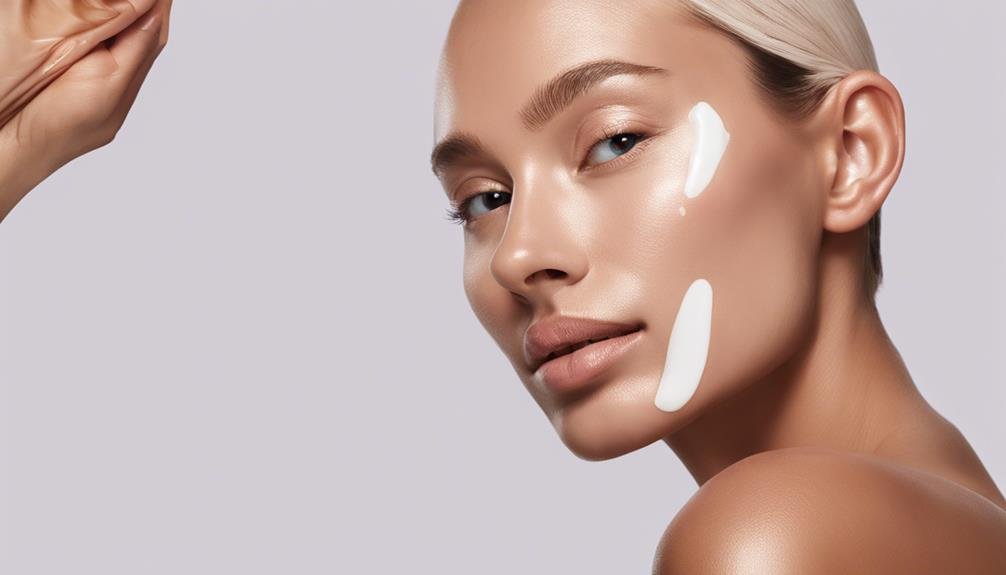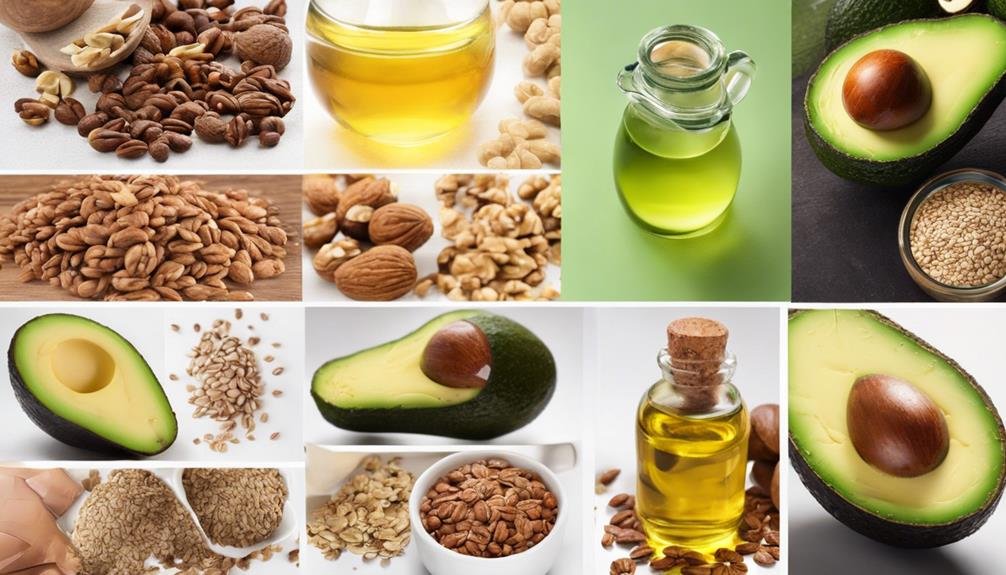"Cherishing Little Steps - A Haven for Baby and Family Journeys"
Essential Vitamins for Radiant Skin
You might not be aware that the key to achieving radiant skin lies in ensuring your body receives the necessary vitamins to support its health and appearance. Understanding which essential vitamins can contribute to your skin's glow is vital for a comprehensive skincare routine. By incorporating these vital nutrients into your daily regimen, you can enhance your skin's radiance and overall well-being. Stay tuned to discover the specific vitamins that can work wonders for your skin and transform your complexion from within.
Key Takeaways
- Vitamin C brightens skin, reduces inflammation, and promotes collagen synthesis for radiant skin.
- Vitamin E protects skin from free radicals and UV damage, enhancing skin health and radiance.
- Vitamin A supports cell turnover, hydration, and reduces aging signs, vital for radiant skin.
- Vitamin D3 combats inflammation, promotes skin cell growth, and repair for a radiant complexion.
- Vitamin H boosts skin barrier function, radiance, and overall skin health for a radiant appearance.
Vitamin C Benefits

When it comes to achieving radiant skin, incorporating Vitamin C into your skincare routine can make a significant difference.
Vitamin C is a powerful antioxidant that helps protect your skin from free radicals, which are unstable molecules that can accelerate the aging process and cause damage to your skin cells. This essential vitamin plays a key role in collagen synthesis, promoting skin elasticity and firmness. Additionally, Vitamin C can help brighten your complexion by reducing the appearance of dark spots and hyperpigmentation.
Including Vitamin C in your skincare regimen can also aid in reducing inflammation and redness, making it beneficial for those with sensitive skin or conditions like rosacea. Its ability to neutralize free radicals can help combat UV damage from sun exposure, further contributing to a more youthful appearance.
To reap the full benefits of Vitamin C, consider using a serum or moisturizer containing this vital nutrient as part of your daily routine. Remember, consistency is key when it comes to seeing improvements in your skin's overall health and appearance.
Vitamin E Sources
To maintain healthy and radiant skin, it's important to consider not only Vitamin C but also other essential nutrients like Vitamin E. Vitamin E is a powerful antioxidant that helps protect your skin from damage caused by free radicals and UV radiation. Including Vitamin E-rich foods in your diet can contribute to maintaining skin health and promoting a youthful glow.
Some excellent sources of Vitamin E include almonds, sunflower seeds, spinach, avocado, and wheat germ. Almonds, in particular, are a convenient and tasty snack that can easily boost your daily intake of Vitamin E. Incorporating these foods into your meals or enjoying them as snacks can help ensure you're getting an ample supply of Vitamin E to support your skin health.
In addition to dietary sources, Vitamin E is also commonly found in skincare products. Applying creams or serums containing Vitamin E topically can further enhance its benefits for your skin, helping to nourish and protect it from environmental stressors.
Vitamin A Importance

Highlighting the significance of Vitamin A in skincare, this essential nutrient plays a crucial role in maintaining skin health and vitality. Vitamin A is essential for promoting cell turnover, which aids in keeping your skin fresh and radiant. It also helps in preventing signs of aging by reducing the appearance of wrinkles and fine lines. Moreover, Vitamin A supports the skin's natural moisturizing factor, helping to keep your skin hydrated and supple.
- Promotes cell turnover
- Reduces signs of aging
- Supports natural moisturizing factor
- Helps maintain skin hydration
Ensuring an adequate intake of Vitamin A through your diet or skincare products can contribute significantly to achieving healthy and glowing skin. Including Vitamin A-rich foods like sweet potatoes, carrots, and leafy greens in your meals can enhance your skin's overall health. Additionally, using skincare products containing retinoids or retinol can also help improve skin texture and appearance. Prioritize Vitamin A for a radiant complexion that exudes vitality.
Vitamin D Effects
Occasionally overlooked in skincare discussions, the impact of Vitamin D on skin health is profound. Vitamin D plays a crucial role in skin cell growth, repair, and metabolism. Exposure to sunlight triggers the production of Vitamin D in the skin, aiding in the regulation of skin tone and supporting the skin's barrier function.
Furthermore, Vitamin D possesses anti-inflammatory properties that can help reduce redness, calm irritated skin, and prevent premature aging.
Research suggests that Vitamin D deficiency may be linked to certain skin conditions such as eczema, psoriasis, and acne. Ensuring an adequate intake of Vitamin D through diet, supplements, or safe sun exposure can contribute to maintaining healthy, radiant skin.
However, it's essential to strike a balance, as excessive sun exposure can lead to skin damage and increase the risk of skin cancer.
Incorporating Vitamin D into your skincare routine, whether through diet, supplements, or safe sun exposure, can help promote skin health and contribute to a glowing complexion.
Vitamin K Role

Amidst discussions on skincare essentials, the significance of Vitamin K in maintaining skin health can't be underestimated. Vitamin K plays a crucial role in promoting skin vitality and overall health. Here's why:
- Wound Healing: Vitamin K aids in the body's natural blood clotting process, which is essential for wound healing and reducing the appearance of scars.
- Skin Elasticity: This vitamin helps in the production of proteins that are vital for maintaining skin elasticity, keeping it firm and youthful.
- Dark Circles: Vitamin K has been shown to help in reducing the appearance of dark circles under the eyes by improving blood circulation in the delicate under-eye area.
- Anti-Inflammatory: It possesses anti-inflammatory properties, which can help soothe and calm skin conditions like redness and inflammation.
Ensuring an adequate intake of Vitamin K through diet or supplements can contribute significantly to achieving and maintaining radiant skin.
Biotin for Skin
When it comes to nurturing your skin from within, the role of Biotin should not be overlooked. Biotin, also known as Vitamin B7, is a water-soluble vitamin that is essential for maintaining healthy skin, hair, and nails. This vitamin helps in the metabolism of fatty acids, amino acids, and glucose, which are all crucial for healthy skin cells.
| Benefits of Biotin for Skin | Food Sources |
|---|---|
| Promotes healthy skin | Eggs |
| Supports skin cell regeneration | Nuts and seeds |
| Helps maintain skin hydration | Sweet potatoes |
| Improves skin elasticity | Avocados |
Incorporating biotin-rich foods into your diet can help enhance the overall health and appearance of your skin. While biotin deficiencies are rare, ensuring an adequate intake of this vitamin can contribute to radiant and glowing skin. Remember, a balanced diet rich in essential vitamins like biotin is key to achieving healthy and vibrant skin.
Niacinamide Benefits

Niacinamide, also known as Vitamin B3, offers a myriad of benefits for the skin. This powerful vitamin can work wonders for your skin health and appearance. Here are some key benefits of incorporating niacinamide into your skincare routine:
- Improves Skin Barrier Function: Niacinamide helps strengthen the skin's barrier, reducing moisture loss and enhancing its ability to protect against environmental stressors.
- Reduces Inflammation: This vitamin has anti-inflammatory properties that can help calm redness, irritation, and acne flare-ups.
- Minimizes Pore Appearance: Niacinamide regulates oil production, which can help reduce the appearance of enlarged pores and maintain a smoother complexion.
- Brightens Skin Tone: Regular use of niacinamide can help fade dark spots, even out skin tone, and give your complexion a radiant glow.
Vitamin B Complex
Within the realm of skincare, the Vitamin B Complex stands out as a powerhouse group of nutrients essential for maintaining healthy and radiant skin. This group includes various B vitamins like B1 (thiamine), B2 (riboflavin), B3 (niacin), B5 (pantothenic acid), B6 (pyridoxine), B7 (biotin), B9 (folate), and B12 (cobalamin), each playing a crucial role in skin health.
B vitamins are vital for promoting an even skin tone, reducing inflammation, and supporting the skin's natural barrier function. They help in the production of collagen, which maintains skin elasticity and firmness. Additionally, B vitamins aid in regulating oil production, reducing acne breakouts, and supporting the skin's ability to retain moisture.
To benefit from the Vitamin B Complex, consider incorporating foods like whole grains, nuts, seeds, dairy, lean meats, and leafy green vegetables into your diet.
Alternatively, you can opt for skincare products enriched with B vitamins to nourish your skin from the outside. Embracing the Vitamin B Complex can contribute significantly to achieving that radiant and healthy skin glow you desire.
Vitamin F for Skin

Vitamin F, also known as essential fatty acids, is a key component in maintaining healthy skin. These essential nutrients play a vital role in nourishing and protecting your skin from within.
- Moisture Retention: Vitamin F helps in retaining moisture in the skin, preventing dryness and enhancing its natural glow.
- Skin Barrier Function: Essential fatty acids support the skin's barrier function, safeguarding it against environmental stressors and pollutants.
- Anti-Inflammatory Properties: Vitamin F possesses anti-inflammatory properties, which can help soothe irritated skin conditions like eczema and psoriasis.
- Collagen Production: Essential fatty acids contribute to collagen production, promoting skin elasticity and firmness.
Including sources of Vitamin F in your diet, such as fish, nuts, seeds, and plant oils, can benefit your skin's overall health and appearance. Additionally, topical skincare products containing omega-3 and omega-6 fatty acids can further enhance the nourishing effects of Vitamin F on your skin.
Vitamin P for Radiance
To achieve a radiant complexion, consider the role of Vitamin P in your skincare routine. Vitamin P, also known as bioflavonoids, plays a crucial part in maintaining healthy and glowing skin. These powerful antioxidants work to protect the skin from oxidative damage caused by free radicals, UV radiation, and environmental pollutants. Including Vitamin P in your daily skincare regimen can help improve skin tone, reduce inflammation, and enhance overall radiance.
| Benefits of Vitamin P for Radiance |
|---|
| Protects skin from free radical damage |
| Improves skin tone and texture |
| Reduces inflammation and redness |
| Enhances skin's natural radiance |
| Supports overall skin health |
Incorporating Vitamin P-rich foods like citrus fruits, berries, grapes, and green tea into your diet can help boost your skin's vitality from within. Additionally, using skincare products containing bioflavonoids can provide targeted benefits for a luminous complexion. Prioritize Vitamin P to promote radiant and healthy skin that glows from the inside out.
Vitamin H Benefits

Consider incorporating biotin, also known as Vitamin H, into your skincare regimen to unlock its numerous benefits for your skin's health and appearance. Vitamin H, a water-soluble B-vitamin, plays a crucial role in maintaining healthy skin, hair, and nails. Here are some key benefits of incorporating Vitamin H into your daily routine:
- Promotes Healthy Skin: Biotin helps to maintain the health of your skin by supporting its natural barrier function and aiding in the production of essential fatty acids.
- Boosts Skin Radiance: By improving the production of keratin, biotin can enhance the overall radiance and glow of your skin.
- Supports Nail Health: Vitamin H strengthens brittle nails and promotes their growth, leading to stronger and healthier nails.
- Encourages Hair Growth: Biotin is known for promoting hair growth and preventing hair thinning, making your locks appear fuller and healthier.
Incorporating Vitamin H into your skincare routine can lead to visible improvements in the health and appearance of your skin, hair, and nails.
Vitamin D3 Effects
Curious about how Vitamin D3 impacts your skin's health and appearance?
Vitamin D3 is essential for skin health as it plays a crucial role in skin cell growth, repair, and metabolism. When your skin is exposed to sunlight, it produces Vitamin D3, which helps in combating inflammation and promoting skin barrier function.
Research shows that Vitamin D3 deficiency may lead to various skin issues such as dryness, eczema, and psoriasis. By ensuring an adequate intake of Vitamin D3 through sunlight, diet, or supplements, you can support your skin's overall health and radiance.
Moreover, Vitamin D3 has been found to have antioxidant properties that protect the skin from free radical damage, thereby reducing signs of aging and promoting a more youthful appearance. Incorporating Vitamin D3 into your skincare routine can help maintain a healthy complexion and support your skin's natural glow.
Frequently Asked Questions
Can Vitamins Alone Give Me Radiant Skin?
Vitamins can play a crucial role in promoting radiant skin. However, achieving truly glowing skin often requires a holistic approach that includes a balanced diet, hydration, skincare routine, and protection from sun exposure.
How Do I Know if I'm Deficient in These Vitamins?
If you suspect deficiencies in essential vitamins, consult a healthcare provider for testing. Symptoms like fatigue, brittle nails, or hair loss could indicate a lack of specific vitamins. Blood tests can provide accurate insights into your nutritional status.
Are There Any Side Effects of Taking Too Many Vitamins?
Taking excessive vitamins can lead to adverse effects such as nausea, vomiting, and even organ damage. It's crucial to follow recommended dosages to avoid potential harm. Consult a healthcare provider for personalized guidance.
Can I Get Enough Vitamins for My Skin From Food Alone?
You can typically get enough vitamins for your skin from food alone. Fruits, vegetables, nuts, and seeds are rich in essential nutrients. Consider a balanced diet to support healthy skin. Remember, moderation is key for optimal skin health.
Is It Safe to Take Vitamin Supplements for Skin Health Long Term?
Taking vitamin supplements for long-term skin health is generally safe when done under medical supervision. Regular monitoring ensures correct dosages and prevents potential side effects. Consult a healthcare provider for personalized advice.
Conclusion
Now that you know the essential vitamins for radiant skin, remember that just like a well-balanced diet nourishes your body, these vitamins nourish your skin. Think of your skincare routine as a garden – with the right vitamins as the seeds that help your skin bloom and thrive. So, plant those seeds, water them with care, and watch your skin glow with vitality and radiance. Your skin deserves the best, so give it the nutrients it needs to shine.

